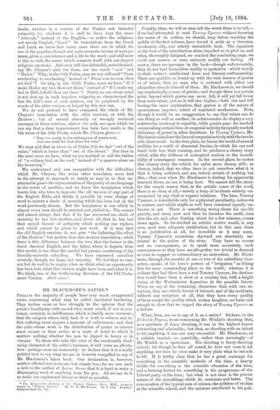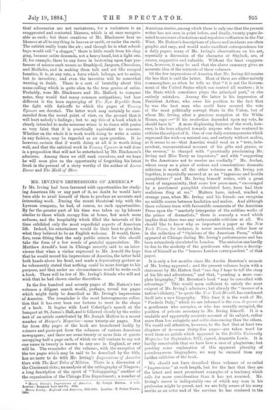MR. BLACKMORE'S SATIRE.* PERHAPS the majority of people have very
much exaggerated views concerning what may be called emotional hardening. They incline more or less strongly to the opinion that the priest's familiarity with sacred rites must result, if not in con- tempt, certainly in indifference, which is hardly more reverent ; that the surgeon whose daily task it is both to witness and in- flict suffering must acquire a measure of callousness; and that the critic whose work is the distribution of praise or censure must sooner or later arrive at a state of mind to which it matters nothing whether his pen be dipped in honey or in vinegar. To those who take this view of the emotionally dead- ening character of the critic's business, it will seem an affecta- tion—perhaps even an insincerity—to declare that it is a really painful task to say what we are in honesty compelled to say of Mr. Blackmore's latest book. Onr declaration is, however, neither affected nor insincere, but simply true, for we owe such a debt to the author of Lorna Doone that it is hard to write a disparaging word of anything from his pen. All we can do is to make our unpleasant labour as brief as possible.
• The Remarkable History of Sir Thomas Upmore, Bart.. M.P., formerly ;mum as " Tommy Upmore. By R. D. Blackmore. In 2 vole. London : Sampson Low an, Co.
Frankly, then, we will at once tell the worst there is to tell,— if we had attempted to read Tommy Upmore without knowing the name of its author, we should, long before reaching the middle of the first volume, have tossed it aside as a tiresome, incoherent, silly, and utterly unreadable book. The signature at the foot of the introduction alone impelled us to plod on, and when, thoroughly fatigued, we reached the concluding page, we could not reverse or even seriously modify our feeling. Of course, there are passages in the book—though unfortunately, they do not lend themselves readily to quotation—which testify to their writer's intellectual force and literary craftsmanship. There are qualities so bound up with the very essence of genius or of talent, that no man who is endowed with either can altogether denude himself of them. Mr. Blackmore is, we should say emphatically, a man of genius ; and though there is a certain point beyond which genius can never fall, it will yet fall lower than mere talent, just as it will rise higher,—both rise and fall having the same explanation, that genius is of the nature of spontaneous impulse, talent of regulated mechanism. Now, though it would be an exaggeration to say that talent can do one thing as well as another, its achievements do display a very noteworthy tendency to equality, while genius pays for marked success along certain lines of congenial activity by equally marked deficiency of power in other directions. In Tommy Upmore, Blackmore abandons the lines of congenial activity with the inevit- able fatal result. In the first place, he leaves the world of normal realities for a world of abnormal fancies, in which his eye and hand both lose their cunning, and he produces a clumsy story which adds the dullness of uninspired realism to the incredi- bility of extravagant romance. In the second place, he makes this clumsy story the vehicle for satire more clumsy still ; so clumsy, indeed, that we often have to ask ourselves what it is that is being satirised, and are, indeed, certain of nothing but this,—that even when Mr. Blackmore is dealing his apparently heaviest blows, no one is being hurt. We cannot tell the story, for the simple reason that, in the artistic sense of the word, there is no story at all,—merely a heap of incidents entirely un- connected by any vital or organic relations. The hero, Tommy Upmore, is remarkable only for a physical peculiarity, unknown to science, and which might as well have remained equally un- known to art. There is something wrong about his specific gravity, and every now and then he forsakes the earth, rises into the air, and, after floating about for a few minutes, comes down again. So far-fetched an artistic motive would, in any case, need very adequate justification, but in this case there is no justification at all, for incredible as it may seem, Tommy Upmore's excursions skyward are absolutely un- related to the action of the story. They have no causes and no consequences, or to speak more accurately, such consequences as they have are altogether too trivial to demand or even to suggest so extraordinary an antecedent. Mr. Black- more, through the months of one or two of his subsidiary char- acters, speaks of his hero's powers of " levigation " as fitting him for some commanding place in the world ; whereas it is evident that had there been a real Tommy Upmore, his destina- tion would have been a show at a country fair, with a bright vision of the Westminster Aquarium in the possible future. When we say of the remaining characters that, with one ex- ception, they are utterly devoid of interest, and of the incidents, without any exception at all, that they have every quality of farce except the quality which evokes laughter, we have said enough to show that we regard the story of Tommy Upmore as a failure.
What, then, are we to say of it as a satire P Dickens, in the Pickwick Papers, wrote concerning Mr. Winkle's shooting that, as a specimen of fancy shooting, it was in the highest degree interesting and admirable ; but that, as shooting with an intent to hit anything, it was not very successful. Mr. Blackmore, as a satirist, reminds us—painfully, rather than amusingly—of Mr. Winkle as a sportsman. His shooting is fancy shooting indeed; for though he fires all round, he does not seem to hit anything, nor does ho even make it very plain what he intends to hit. It is pretty clear that he has a great contempt for something in the scientific methods of the time, a hearty dislike for something in the scientific education of the time, and a burning hatred for something in the programme of the Liberal party of the time ; but what is not clear is the precise nature of the somethings which he contemns and hates. The conversation of his typical men of science, the syllabus of studies at the scientific school, and the opinions attributed to his poli- tical adversaries are not caricatures, for a caricature is an exaggerated and contorted likeness, which is at once recognis- able as such ; but these creations of Mr. Blackmore bear no likeness at all to anything in heaven or earth, or under the earth. The satirist really beats the air ; and though he is what school- boys would call " a slogger," there is little result from his slog- ging, because satire demands, not a heavy hand, but a light one. If, for example, there be any force in bestowing upon fonr pro- fessors of science such names as Brachipod, Jargoon, Chocolous, and Mullicles, and in making them talk and act like escaped lunatics, it is, at any rate, a force which belongs, not to satire, but to invective; and even the invective will be somewhat wanting in finish. There is a sort of brutality about this name-calling which is quite alien to the true genius of satire. Probably, were Mr. Blackmore and Mr. Mallock to compare notes, they would find many common antipathies ; but how different is the keen rapier-play of The New Republic from the fight with fisticuffs to which the pages of Tommy Upmore are devoted. The latter work may certainly be com- mended from the moral point of view, on the ground that it will hurt nobody's feelings ; but to say this of a book which is clearly intended to make someone wince is to damn with praise so very faint that it is practically equivalent to censure. Whether on the whole it is work worth doing to write a satire in any fashion, may be regarded as an open question. It is, however, certain that if worth doing at all. it is worth doing well, and that the satirical work in Tommy Upm ore is well done is a proposition that will not be entertained by Mr. Blackmore's admirers. Among these we still rank ourselves, and we hope he will soon give us the opportunity of forgetting his latest freak in the perusal of a story worthy of the author of Lorna Doone and The Maid of Sker.



































 Previous page
Previous page